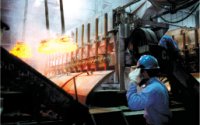forum
library
tutorial
contact

Kaiser Closing Mead Smelter
by Bert CaldwellSpokesman Review, December 11, 2000
|
the film forum library tutorial contact |

|
Kaiser Closing Mead Smelterby Bert CaldwellSpokesman Review, December 11, 2000 |
Firm to sell power; 400 workers idled for 10 months
 Kaiser Aluminum
Corp. shut down its
Mead smelter
Sunday, and the
plant likely will stay
idle until next
October.
Kaiser Aluminum
Corp. shut down its
Mead smelter
Sunday, and the
plant likely will stay
idle until next
October.
By the middle of the week, the last 400 members of Mead's hourly work force will be at home.
The news comes just two months after workers returned from a prolonged companywide strike and lockout.
The World War II-era smelter never before has completely stopped aluminum production since Henry Kaiser obtained the plant from the federal government in 1946.
Kaiser Vice President Pete Forsyth said the Mead closure will not affect operations at Kaiser's Trentwood rolling mill, where 1,000 employees work with raw aluminum supplied mostly from Mead.
Alternative arrangements have been made, he said.
Spokeswoman Susan Ashe said all but a handful of the laid-off workers will receive 70 percent of their wages and full medical benefits while they are out of work.
For the time being, she said, all salaried workers will remain at the smelter.
Kaiser blamed the closure on an electricity shortage that has plagued the West Coast since June. Power prices have hit unprecedented levels, and the company will earn more money selling electricity than it would have made producing aluminum, a process that requires huge amounts of electricity.
Four Mead potlines were consuming 191 megawatts Saturday. That electricity had been purchased from the Bonneville Power Administration.
Selling Mead's power back to the BPA for just the remainder of December will net Kaiser $52 million before expenses associated with the shutdown.
Forsyth said Kaiser will continue to sell that same block of electricity either monthly or for longer times until Sept. 30, when a new BPA contract will kick in.
In November, Kaiser sold another block of Mead power in an 11-month contract that earned the company $47 million, but cost 130 members of the United Steelworkers of America their jobs. Forsyth said prices for that size contract have almost quadrupled since then.
Kaiser closed its Tacoma smelter and a portion of Mead in June and sold that power as well.
Mead becomes the fourth of the Northwest's 10 smelters to close due to high power costs. Forsyth hinted that other announcements may be forthcoming.
Several other major consumers of electricity also have announced shutdowns or curtailments in recent days.
While acknowledging the power sales will be good for Kaiser, he said the deal also will be good for the Northwest because more power will be available for other uses.
On Sunday, regional energy officials renewed a warning that electricity supplies are tight. And the governors of Washington and Oregon have asked all residents to conserve as much power as possible.
"Something has got to happen energy-wise," Forsyth said, noting that desperate utilities began inquiring about the availability of Mead's power in the middle of last week.
Dan Russell, president of the Steelworkers local that represents Mead workers, said he was notified Friday afternoon that a shutdown was imminent.
But tapping the last of the molten aluminum out of Mead's potlines was delayed because Kaiser's contract with Bonneville requires 48-hour notice if the company intends to sell back a block of power for a term of less than one month.
Russell said the call to start the tapping came at 6:45 a.m. Sunday.
The decision was not a surprise, particularly after last month's power sale, he said.
"We anticipated something," Russell said. "We didn't know it would be the whole thing."
He said he understands Kaiser must do what it can to make money. The company could make as much as $500 million selling power if electricity prices do not ease up, he said.
"It's mind-boggling," Russell said. "They don't even have to run the plant and (they) get this windfall."
He noted that, by comparison, Kaiser was reporting quarterly profits of perhaps $12 million just before the Steelworkers went on strike against the company Sept. 30, 1998.
The strike, which subsequently became a lockout, was resolved this September.
Ironically, Russell said, the strike may have seasoned union members for the months ahead.
After living on $140 per week in strike pay and food assistance for two years, getting by on the compensation and benefits Kaiser will pay over the next nine-plus months will be easy, he said.
"A person can survive," Russell said, adding that the most senior employees will do best.
Younger workers, like his sons-in-law, will have a tougher go, he said. "We've got a pretty tight circle here."
Although hopeful regarding a restart at Mead, Russell said he is concerned Kaiser will renege on those assurances if the economics of the aluminum industry in the Northwest do not improve.
Russell said the Steelworkers have been confused by a recent Kaiser advertising campaign that highlighted a transformation into a highly efficient company while jobs disappeared around them.
"The community should be outraged," he said.
The Bonneville contract that takes effect next Oct. 1 will provide Kaiser with power to operate four Mead potlines.
"We need more than that," Forsyth said, if Kaiser is to generate enough revenues to cover all the expenses of maintaining its smelting operations in the Northwest.
The company also owns smelters overseas.
Chairman Ray Milchovich, in a prepared statement, said Kaiser participation in new power plants will be one of the alternatives reviewed by the company in the coming months.
"We plan to work together with our employees and others to continue to communicate about the region's energy crisis," he said.
learn more on topics covered in the film
see the video
read the script
learn the songs
discussion forum
